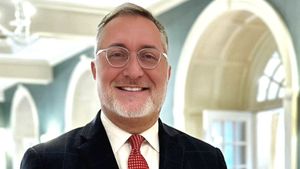Despite there being constant evidence showing that HIV-positive people who are undetectable cannot transmit HIV to another person, the dialogue seems to be only happening in wide metropolitan areas or small advocacy groups in rural cities. Needless to say, the message is getting missed by those who need to hear it most.
There are a lot of people living with HIV who aren’t getting information from their clinical providers and communities about the importance of adhering to treatment and sustaining viral suppression. And it’s not only folks living with HIV who aren't getting the memo.
The message is loud and clear throughout the media, as well as HIV-negative people who have little opportunity to educate themselves.
With more education, we have a bigger chance of stalling existing HIV criminalization laws in the United States and around the world that vilify and marginalize people living with the virus — even those who are undetectable and present zero risk to their sexual partners.
AIDS United, the nation’s largest and longest-running coalition of community-based HIV/AIDS groups, released a statement this week urging clinical providers and educators to share the message:
Undetectable equals Untransmitable.
The Washington D.C. based organization includes groups like the Gay Men’s Health Crisis, Housing Works, Los Angeles LGBT Center, AIDS Foundation of Chicago, Positive Women’s Network, Souther AIDS Coalition, and Harlem United, among others — all of whom signed off on the statement.
Read the statement below:
“Substantial evidence strongly demonstrates that a person living with HIV who has a sustained, undetectable viral load cannot sexually transmit HIV to another person. Continued analysis of large-scale clinical trials has shown zero cases of HIV sexual transmission. This expands on prior data that the risk of HIV transmission from a person living with HIV who is on antiretroviral therapy and has achieved an undetectable viral load (viral suppression) in their blood for at least 6 months is negligible to non-existent.
Too many people living with HIV are not getting the message of this benefit of treatment and sustained viral suppression from their clinical providers or the HIV education and advocacy community. Understanding that maintaining viral suppression through successful anti-retroviral therapy not only maintains health but also prevents transmission can encourage people living with HIV to initiate and adhere to treatment regimens and may help reduce HIV-related stigma. We acknowledge, however, that social and structural barriers exist that prevent some people living with HIV from achieving viral suppression.
Outdated HIV criminalization laws and policies in the U.S. do not reflect the current science related to HIV transmission risks. Scientific evidence about the reality of transmission risk based in this data about viral suppression and transmission risk has already had an impact on HIV criminalization statutes and prosecutions in Europe.”
AIDS United also gave three recommendations to providers and health departments:
#1) That providers and educators consistently share the message that new evidence demonstrates that a person living with HIV who has a sustained, undetectable viral load cannot sexually transmit HIV to another person.
#2) That the Department of Health and Human Services Antiretroviral Guidelines Committee examine this issue further and consider updating Guidelines language.
#3) That HIV criminal laws and policies in the United States be modernized to reflect the science related to viral suppression and HIV transmission risk



































































